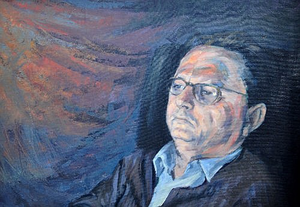
Robert Simpson was born on March 2nd 1921 in Leamington Spa, England. He was educated at Westminster City School, and played in brass bands as a boy. His family initially intended him to be a medical doctor, and he served in a mobile surgical unit during World War II as a conscientious objector. During this time he studied music under Herbert Howells. He established the tonal basis of his compositional style after studying and rejecting serialism (writing and destroying four symphonies in the process). Interestingly, the inspiration for his characteristic use of tonal conflict came from Schoenberg:
Schoenberg is far from being my favorite composer, but it so happens that the idea for a new treatment of tonality came to me from listening, not to Nielsen or any other composer I love, but to Schoenberg’s Piano Concerto, many years ago. It struck me that in spite of the serial technique the work was fixed to a tonal centre, which loomed periodically behind the murk, and was deliberately avoided at the end – as if Schoenberg had finally made a fearsome effort to exorcise a ghost. I thought then, though I didn’t know how, that it might be possible to make a positive use of this phenomenon. I didn’t want, as Schoenberg did, to deny tonality – I wanted to find a way to make tonal centres react against each other, not make non-tonality react against tonality. I felt (and still feel) that to try to anaesthetise the listener’s tonal sense was to deny oneself a powerful means of expression. So atonality was not for me.
Robert Simpson, TONIC, Vol. 5, p. 13
His earliest surviving compositions include the Piano Sonata (1946) and the First Symphony (1946-51). During the composition of the symphony, Simpson discovered the music of Carl Nielsen:
After my encounter with Schoenberg had produced what Hans Keller calls productive tension, Nielsen gave me the kind of intellectual and spiritual support I needed to help me go my own way.
Robert Simpson, TONIC, Vol. 5, p. 13
Simpson gained a doctorate in music from the University of Durham in 1951 after submitting the symphony as his thesis. In the same year he completed his First String Quartet, and his activities as the founder of the Exploratory Concert Society (in which he would play and discuss little known music that he found interesting) led to him joining the BBC as a broadcaster and producer.

In 1980, Simpson resigned from the BBC in protest at the corporation’s musical policies concerning the Henry Wood Promenade Concerts. In 1986 Simpson moved to the republic of Ireland, where he continued to compose. In 1991 he suffered a serious stroke that left him partially paralysed. Despite this, he completed his Second String Quintet in 1995, and embarked on another (16th) string quartet.
Robert Simpson died on 21 Nov 1997. He was 76 and is survived by his wife Angela. The London Times of 22 Nov 1997 carries an obituary.
Simpson’s influence on British musical life has been important in several respects. As a composer, he completed 11 symphonies and 15 string quartets. These works form the central core of his achievement and are rapidly gaining recognition as some of the most significant examples of their kind written in the 20th Century. His works for brass band are regularly performed at competitions. As a musicologist he has championed the revival of interest in Bruckner and Nielsen, writing “The Essence of Bruckner” (1966) and “Carl Nielsen: Symphonist” (1952, revised 1979). His friendship with the neglected composer Havergal Brian encouraged Brian to write most of his later works. Simpson helped arrange for the first performances of several of Brian’s symphonies, including the “Gothic”. As a radio broadcaster and producer he introduced many people to the wonders of classical music with his passionate advocacy of the music he loved.
Simpson’s compositions have remained largely unknown outside of Britain until recently. Partially sponsored by the Robert Simpson Society and the Rex Foundation, a series of recordings on the Hyperion label has enabled the general public to hear them.
